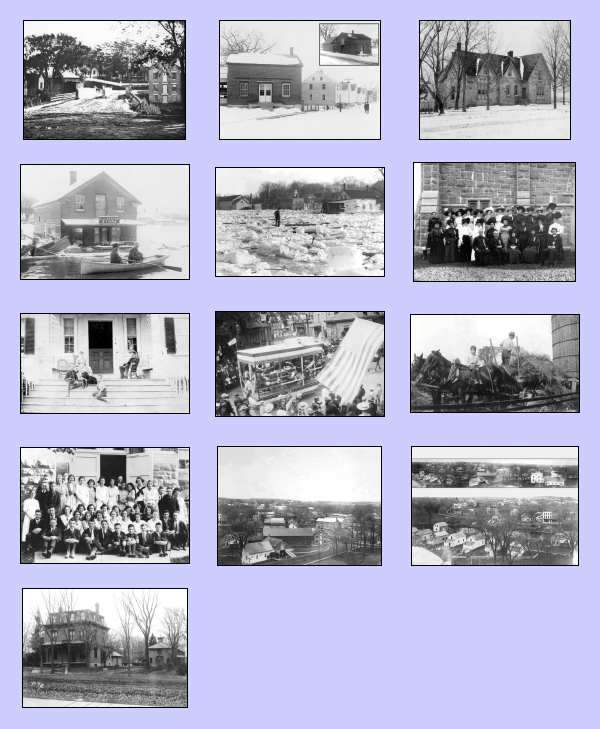2007 Champlain Historic
Calendar
The Founding
of the
Village and
Town of
Part I
Towards the end of the Revolutionary War, the State of New York authorized the raising of two army regiments on bounties of unappropriated land. For his service, Pliny Moore received a large land grant from the State that became most of the current Town of Champlain. Towards the end of his enlistment, he surveyed this land and organized the settlement of the village and town by other soldiers who were paid with similar land bounties. In May of 1788, Pliny established the settlement of Champlain and became one of the first residents of the future village. Pliny’s letters give a first-hand account of the founding of the Village and Town of Champlain as well as the creation of Clinton County.
Pliny Moore was born in Sheffield, Massachusetts, on April 14, 1759, and was a descendent of some of the first English settlers of Massachusetts. His family later moved to Spencertown and Kinderhook, New York, where he spent most of his childhood. After the Revolutionary War started, Pliny enlisted into the army in April of 1776 at the age of 17. Pliny had several enlistments and served under various commanders in the Albany area and Mohawk Valley. By 1781, he was a Lieutenant and Adjutant. One of his jobs was to keep track of the soldiers’ enlistments and to record and disseminate orders from his commanders.
New York States Passes the Land Bounty Laws
On March 20, 1781, and March 23, 1782, New York State passed two laws to raise regiments for the defense of the state. The state pledged to give away bounties of unappropriated “wasteland” in the western and northern parts of the state as payment for a soldiers’ service. The amount of land a soldier was given depended on his rank. A non-commissioned officer and private would receive 100 acres, a captain would receive 300 acres and a colonel 500 acres. Sometimes the soldiers re-enlisted after their service ended to earn more land. For his service, each soldier was given a land certificate indicating how much land they were owed. Because Pliny was educated, good at keeping records and was well respected by his fellow soldiers, they appointed him to find and secure the lands that were due them. Twenty-two soldiers signed their first bond (agreement) with Pliny on March 21, 1782.
Pliny was often in communication with his father Noadiah concerning the securing of unappropriated lands. His father pressured him to find the best land within the state. In one letter, dated May 17, 1782, his father wrote “I Saw Major Hitchcok from Albany who Tells me that the Albany Gentlemen have Located a Large Quantity of Land at and Near fort thunters at Crown Pint Lake gorge Jeseps Paten &c you are Too Slow those Lands are Twice the Value or 3 times as you may git by Waiting Longer I advise you & Capt Write to go To Som Gentlemen in Albany and find by surveyor plans and Maps perhaps you may find a Wedge of Lands Some Where Between Two pattens where you may Git Something Good and near by Mr. Abraham Yates may be the man or Some other Consideration you have Waited Two Long all ready…”
A second letter written by Pliny’s father on June 25, 1782, shed more light on the passage of the law by New York State and the pressure of finding good land. Noadiah wrote, in part, “…hath Taken advice and finds the Indians Can Locate all of the Lands that are unapropriated and the Esqur Sons have bought up a number of Soldiers Rights and mean To Lay 5000 achers by way of Indians on these Disputed Lands.” This is also the first letter to mention James Dean (1748-1823) of Whitesboro, who was an acquaintance of the Moore’s. Dean was the government agent with the Oneida Indians in Western New York and soon became instrumental in the securing of the Champlain land grant for Pliny. Noadiah wrote,”Mr. Dean hath ben to Albany hath Don nothing Wants your Sertificate but is Disapointed about that Place he aimed at and hath found non as yet …Says you can Do as you pleas with all of your Locations Except your one Between you and him that he thinks he Can Lay out for beter advantage when he Returns.”
A second bond was
signed by Pliny and 20 more soldiers on July 3, 1782. This was
about three months after the second
Land Bounty law was enacted by the state. In the agreement, the
soldiers appointed Pliny to act as
their agent to
find and secure unappropriated lands within the state. This
contract was to give Pliny one-fifth of
the soldiers’ land and pay him 10,000 Pounds.
:
:

the Clinton County Historical Association in Plattsburgh, New York or the author.

